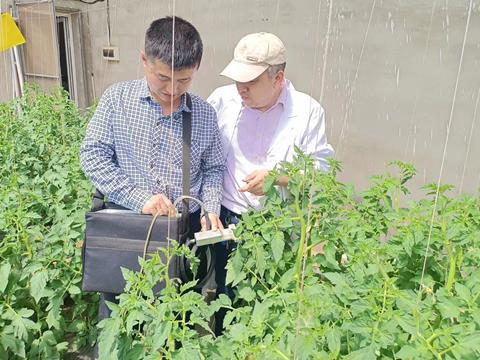Spain’s Kimitec teams up with Yunong and BAAFS to design sustainable solutions for broccoli, lettuce and Chinese cabbage
Kimitec’s MAAVi Innovation Centre has joined forces with Chinese vegetable producer Yunong, and the Beijing Academy of Agricultural and Forestry Sciences (BAAFS), to develop sustainable solutions to boost the productivity of broccoli, lettuce and Chinese cabbage without the use of harmful chemicals that are harmful to human health and the environment.

The ambitious project, which has a budget of €811,000, started in 2022 and is scheduled to end in 2025, is being financed by the Spanish Centre for Industrial Technological Development (CDTI) through the Spanish-Chinese Bilateral Programme for Technological Cooperation (CHINEKA).
Chinese consumers are becoming increasingly concerned about food safety and health. Larger cities are determined to prevent chemical and toxic residues from industrial activities from entering the local food system.
Furthermore, as the recent global pandemic crisis has evidenced, the reduction of greenhouse gas emissions and the conservation of biodiversity are major challenges the world should be tackling.
The Bio-Chain Project brings together the MAAVi Innovation Centre, a leading R&D facility for natural and productive agricultural solutions owned by Spanish biotech company Kimitec; Yunong, one of the largest vegetable producers in China with around 2,000ha of lettuce, tomato, cucumber and cabbage plantings; and BAAFS, a specialist in plant nutrition, soils and crops.
“Many regions in China are currently suffering the effects of climate change. Our natural biotechnology solutions are designed to protect and sustainably manage crops and natural ecosystems, being essential to help countries comply with the 2015 Paris Agreement, decarbonising their economies and increasing their resilience,” said Kimitec’s international CEO, Alejandro de las Casas.
Nature-based solutions are included in many of the goals established in the Kunming Declaration, signed by representatives of over 190 countries last October 2021.
In addition to mitigating 30 per cent of the CO2 released into the atmosphere, these environmental initiatives aim to improve crops and, as a result, also food; provide clean or potable water; and contribute to achieving a greater resilience against natural disasters.
In this regard, the country has proceeded to designate “areas of sustainable development”, thus also implementing the UN’s 2030 Sustainable Development Goals.
The Bio-Chain Project was created to develop tailor-made natural solutions for some of the problems affecting major crops in China, including broccoli, lettuce and cabbage.
These crops are especially sensitive to abiotic stresses due to low temperatures and high salinity, to pests such as Plutella xylostella (also known as diamondback moth) and aphids; and to fungal diseases such as downy mildew caused by Peronospora sparsa or black rot in broccoli caused by an Alternaria infection, among others.
The project also includes the development of a prebiotic solution adapted to the most typical soils in the country, which will promote the growth of beneficial microbiota specific to those cultivation areas.
Several studies are currently analysing nutritional balance in soils, as well as the isolation and identification of microorganisms present in those soils.
Kimitec’s MAAVi Innovation Centre will design this new generation of natural solutions: biopesticides, biostimulants, and prebiotics, capable of nourishing plants and protect them at the same time.
The solutions will be designed with a lower cost perspective, to adapt these bioproducts as much as possible to the reality of the Chinese market and opening a way to expand research activities to other fruits and vegetables in the country.
Kimitec said MAAVi’s knowledge about botanical components and microencapsulation technologies to obtain a controlled, persistent release to the crops would make a difference in the project.
Yunong will define the agronomic challenges, and lead the activities related to determining crop and soil needs, such as defining biotic and abiotic stress factors, while BAAFS, university specialised in nutrient management and soil characterisation, will lead the evaluation of the effectiveness of the bioproducts in field trials organised in different Chinese regions.



